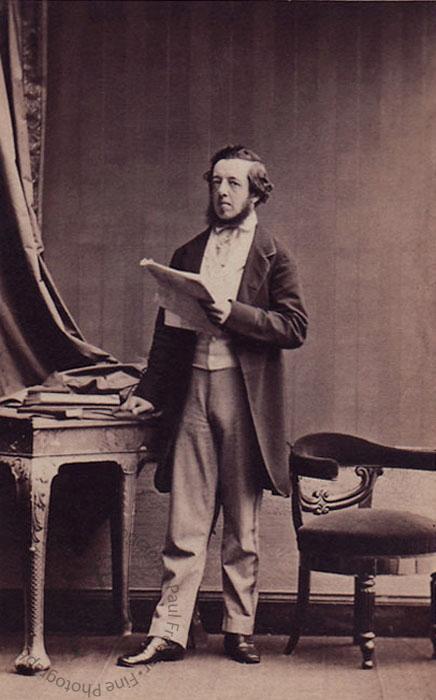Lord Manners
(1818-1906)
18 July 1861
Volume 4, page 232, sitting number 5000.
Lord John James Robert Manners succeeded his older brother in 1888, becoming the 7th Duke of Rutland.
He was born at Belvoir Castle on 13 December 1818, the younger son of the 5th Duke of Rutland by Lady Elizabeth Howard, daughter of Lord Byron's guardian, the 5th Earl of Carlisle. Lord John Manners, as he then was, was educated at Eton College and Trinity College, Cambridge. In 1841 he was returned for Newark in the Tory interest, along with Gladstone, and sat for that borough until 1847. Subsequently he sat for Colchester, 1850–57; for North Leicestershire, 1857–85; and for Melton from 1885 until 1888, when his brother died and he succeeded to the dukedom, taking his seat in the House of Lords.
In the early 1840s Manners was a leading figure in the Young England movement, led by Benjamin Disraeli. During the three short administrations of Lord Derby (1852, 1858-1859, and 1866-1868) he sat in the cabinet as First Commissioner of Works. On the return of the Conservatives to power in 1874 he became Postmaster-General under Disraeli, and was made GCB on his retirement in 1880. He was again Postmaster-General in Lord Salisbury's administration, 1885-86, and was head of the department when sixpenny telegrams were introduced. Finally, in the Conservative government of 1886-92 he was Chancellor of the Duchy of Lancaster.
Lord Manners married twice and had a total of five children. He died at Belvoir Castle on 4 August 1906.
'The Duke of Rutland expired at a quarter to one on Saturday morning, at Belvoir Castle, Grantham, the magnificent ancestral home which his father, the fifth duke, restored and in great measure re-built after the disastrous fire which in 1816 threatened the whole building with destruction. His Grace, who was the seventh duke, caught a cold early in June, and an attack of bronchitis and gout supervened. He had been unconscious for several days before his death. [...] The Duke of Rutland will long be remembered as one of the devout and devoted laymen who are alike the mainstay and the glory of the Church of England. Lord John Manners was the typical Tory Churchman, being in his early days a connecting link betwen two movements. He united the aspirations of Disraeli's Young England party with the convictions and activities of the High Church revival, which at Cambridge far more than at the sister University concerned itself with ecclesiastical art' (Western Gazette, 10 August 1906).
[A portrait of his older brother appears on page 62 of this section.]

